Vermont legalized the possession and at-home growing of cannabis in 2018. Then, in 2020, lawmakers approved a recreational cannabis market. The idea was to “tax and regulate.” Fast-forward to today, and the very first Vermont dispensaries are preparing to open their doors in October.
So … Cannabis. For sale. In stores that you can walk right into?
How is this gonna work?
That's what a listener in New Jersey asked Brave Little State, Vermont Public's show that answers questions that have been submitted and voted on by our audience. Their question was: "What’s the status of opening dispensaries for cannabis in Vermont?”
We weren’t able to get in touch with the question-asker, so Vermont Public’s senior political reporter, Bob Kinzel, went over the opportunities — and challenges ahead — with our team: Myra Flynn, Angela Evancie and Josh Crane.
Subscribe to Brave Little State for free, so you never miss an episode:
Loading...
Note: Our show is produced for the ear. We recommend listening to the audio if you can! Transcripts are generated using a combination of speech recognition software and human transcribers. They may contain errors, so please check the corresponding audio before quoting in print. Some parts have been edited for clarity.
How we got here
Bob Kinzel: This is an issue where we could go off into so many different tangents that are so fascinating. Because I think Vermont has a very unique approach to what's known as “tax and regulate” for its cannabis retail marketplace. And it's looking at other states and what they've done and incorporating some of that but, at the same time, taking a very Vermont approach to this whole issue. So I thought we could start at the Vermont State House. And the first person that I wanted to hear from was Wilmington Representative John Gannon.
Representative John Gannon: Vermont’s current law is awkward because it’s a legalized product without creating a safe legal access to it.
Bob: Now, remember. Back in 2018, Vermont passed a law that essentially legalized cannabis in Vermont and said you could possess up to an ounce and you could grow several plants, but you couldn't sell it. So it set up this situation: Well, I can possess cannabis, but I can't buy it anywhere, because it's illegal to sell it. So Gannon started off by saying, you know, we got a pretty awkward law right here. And maybe it would be helpful if we could clarify for people exactly how this law is going to work. That really was the main argument in the House and Senate in the 2020 session.
Gannon: The goal of this bill is the elimination or near elimination of the black market, delivery of a product of a certified purity and known potency while minimizing the growth of heavy or hazardous use and use by children.
Bob: Dick Sears, who is the Senate Judiciary Chairman from Bennington becomes kind of the unlikely supporter and leader of the cannabis market. And his whole approach is, hey, Vermonters are going to other states to buy cannabis legally. If that's the case, it ought to be available here. And we have a real opportunity to make it safer here ...
Chairman Dick Sears: And we know that many Vermonters, that they're going and they're buying it in the black market and so forth. And we'd prefer to have Vermonters buying it in Vermont, a regulated drug.
Bob: ... And take some of the revenue that's going to be derived from the sale of cannabis and put it into after school programs, put it into youth prevention programs. And Sears really becomes the champion of the “tax and regulate” bill.
Sears: And this is an opportunity to regulate, to make sure that what our people are buying, if they don't go to another state, is tested and proper.
Bob: After the passage of the law, the next step really falls to the Cannabis Control Board. This is a three-person board that's appointed by Governor [Phil] Scott. And they're really charged with implementing this law in every aspect you can think of, from licensing growers to licensing people who will test and the people who will manufacture. And, you know, the sort of overriding thing here is that because of the federal prohibition, everything in Vermont has to happen in Vermont. So it has to be grown here. It has to be tested here. It has to be manufactured here. And it has to be sold here. And there can be no interruption in that supply chain. Everything has to be within Vermont.
Myra Flynn: I think it's amazing that you can't have any part of the cannabis process done outside of the state. Is that usual or is that just a Vermont thing?
Bob: No, that's a usual thing. That's going to be true in every state because of the federal prohibition. So it's going to be against federal law to transport cannabis across state lines in any form, be it raw cannabis, gummy bears. "Let's send it out of state to be tested and then bring it back" — can't do that either. This is a real challenge for us. Because we've got to build these different sectors of the cannabis marketplace. We've got to build them from scratch, and have them all ready by the first of October.
_
Vermont’s cannabis marketplace
James Pepper: There's always a rocky start to the rollout of this these cannabis markets. And it's because of federal illegality.
Bob: So, at the corner of State and Main street in Montpelier is the city center office complex. And up on the third floor we have the offices of the Cannabis Control Board. And the chairman of the board is James Pepper.
Pepper: And so, really, when you think about Vermont, we have some of the highest usage rates, we have a very robust illicit market right now.

Bob: Somewhere around 30% of all Vermonters say they have used cannabis in the last 30 days. That's one of the highest numbers in the country. So, James Pepper says, we've got great growers, there's no doubt about that. Now, how do we bring those growers into the legal marketplace? That’s really the main priority of the Vermont law, as he explains it. So, he's making overtures to growers, small growers, to say: Please join us. We need you. You guys are great. We need you to be part of this success.
Pepper: These people are very good at what they do, which is growing cannabis. And so we need to shift them into a regulated space and kind of break down barriers to entry and really try and help this group of people that has really developed their craft in an unregulated space.
Bob: So the idea is to only license very small growing plots at the beginning. Now, small is about 1,000 square feet. And I've tried to wrap my head around, what's 1,000 square feet? If you imagine a basketball court and you cut the court in half, and then you had half of a basketball court, and you cut that in half, you'd have about 1,000 square feet. Or think about a two-car garage, a typical two-car garage that's attached to someone's home — that's roughly 1,000 square feet.
Myra: Or maybe like the largest New York City apartment that ever existed for rent?
Bob: That's right.
Angela Evancie: But 1,000 square feet, that's small! If you think about other Vermont growers or producers who are making a product, they have like huge fields, hundreds of acres.
Bob: It's very small, and it's going to take probably around 300 growers to supply enough product. Now, there are some larger tiers that are being authorized at this time. There's also a combination indoor-outdoor license, where you could have 1,000 square feet indoors and up to 5,000 or 6,000 square feet outdoors. So, you can do both. And, the reality is, we're only going to have one harvest in Vermont outdoors. And the idea is we could have four harvests indoors.
Josh Crane: In [growers’] ideal world, why would they prefer growing outdoors? Is it just nice to be outside? Or why?
Bob: I think that's it. I think at heart, these are agricultural folks. And there's something that they find very satisfying about growing plants outdoors.
Myra: It also takes away that, like, illicit feeling. I don't know, there's something about growing, you know, cannabis indoors, it still feels, you know, naughty.
Bob: Yes, I would agree with that. Because there's still a stigma around cannabis. Everyone I talked to for this episode talked about how maybe it's a generational thing. Maybe around 50 or 55 is the tipping point: If you're under 50, recreational cannabis … what's the big deal? What took so long? So, James Pepper talks about emphasizing small growers bringing the people already growing in the illicit market into the legal market. And what he really envisions is that different growers are going to develop reputations. He compares it to Vermont’s small craft beer industry.
Pepper: Having a lot of small cultivators really is the kind of engine of innovation. And it will drive kind of a diversity of products. It will create craft, quality.
Cannabis vs. hemp, THC vs. CBD
Angela: We’re talking about different cannabis products that will be on the market someday. But, I feel like there are also already some products that you can buy now, like CBD oil or CBD-infused cold brew coffee. So, can you help us understand what is already legal? And what is the difference between some of these products?
Bob: That’s a great question and it’s one that I wasn’t sure of the answer [to]. I had to do a little research because we’re gonna hear from folks who are growers, folks who are growing CBD right now who are gonna transition and expand into THC. So, it’s really what’s the difference between all these things?
THC [Tetrahydrocannabinol] is the substance that gets people high. It also has medicinal qualities, particularly for people who have chronic pain conditions.
CBD [Cannabidiol] has almost no THC in it by law. By definition, it cannot contain more than three-tenths of 1% of THC. If it does, it can't be used for CBD.
The amazing thing is [THC and CBD] come from exactly the same plant. So, when you talk about the cannabis plant, you are talking about CBD, which has no mood-elevating experience with it, and THC, which does. So, you might ask, how is that possible? And what I'm told is the plants have vastly different sub-species characteristics. We're probably into more biology than I can go into, but that's where the real difference is. Now, they both can be smoked. They both can be distilled into oil tinctures. They both can be used as balms. They both can be made into edibles, like gummies or little pieces of chocolate. So, what I'm told in the cannabis industry is that CBD plants — and those are the ones with virtually no THC — are often referred to as hemp, and the higher-THC plants are often referred to as cannabis.
Lauren Andrews, Capital Cannabis Co.
Bob: A really important part of this whole retail marketplace is where the cannabis is going to be sold. And by “cannabis” I’m talking about THC now ... There are probably going to be 50 or 60 stores around the state of Vermont that will be selling cannabis products starting on October 1, and one of them is going to be in Montpelier. I had a chance to go down there and meet with the owner of the store, Lauren Andrews, who currently runs a business called AroMed. She sells CBD from a lot of producers in Vermont [and] other sorts of natural health remedies. And she has applied for a license and just got her lease signed. So I visited her at her empty storefront.
Lauren Andrews: Oh, yeah, it's all decorated. I've got the color scheme, I've picked out the light fixtures. What I like about this space is that it is going to be extremely easy to secure, which is one of the top priorities.
Bob: She formerly was a psychiatric nurse. And she found that some natural remedies actually worked better for patients than heavy-duty pharmaceuticals. And so that led her on a path of, “I gotta learn more about this.”
Lauren: And once I started going down that path, it was really clear that that's where I was meant to be. That's where I was meant to serve.
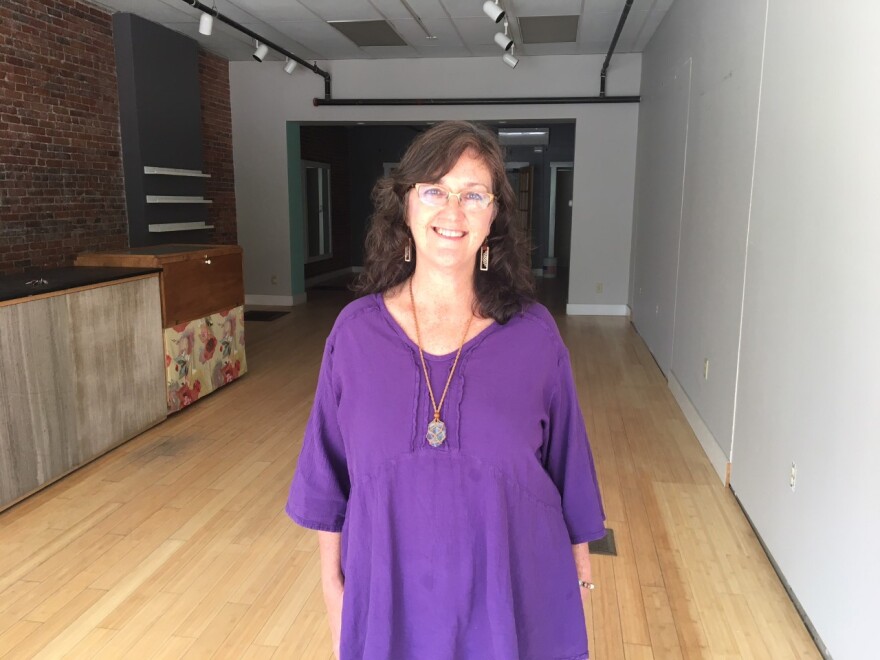
Bob: And she talks about some of the difficulties of trying to start a business where you have a federal prohibition: Banking is a huge problem. You can't do banking with an established bank that has a federal charter. Well, that's just about everybody. The only people it doesn't really include are the state credit unions who are chartered through the state of Vermont. To get insurance to cover the store, it's a skyrocketing rate if you can even get it. And on top of that, Montpelier has a number of empty storefronts, but you have landlords who have mortgages on those buildings with a federally-chartered bank and they’re very reluctant to lease to a cannabis retail operation that's in violation of federal law. So, it gets complicated.
Lauren: And it's been 10 months of a very arduous search to find the right place and a landlord who'd be willing to work with me and, and I found that here. And I'm just so happy to be in downtown Montpelier. It'll just be another feather in Montpelier’s cap.
Bob: And we're talking about her store opening October 1, which is a very ambitious goal. That's the first day that any store can legally open in the state of Vermont. And, I should just add to that, that James Pepper at the Cannabis Control Board, he describes it as, there are going to be some supply chain issues, there are going to be huge lines outside the stores. So there's going to be huge demand in the very beginning of October, and maybe not a lot of product. Now, one way around this is, in the law that was debated by the Legislature this past session, is a provision where a consumer can actually order their product online.
Pepper: Online ordering for in-store pickup. So, you can, just like through a lot of grocery stores or a lot of restaurants, go online, see what's on the menu today, see what's being packaged and cultivated.
Bob: So you could go online to Capitol Cannabis Company and say I'd like to get that bag of brownies.
Myra: Bob, I just wanna note that I think I’ve heard you talk about gummy bears, brownies, chocolates. I mean, is this a tell? Do you just have a really bad sweet tooth?
Bob: I have a passion for brownies and chocolate, especially chocolate cookies. Chocolate oatmeal cookies, chocolate walnut cookies. So, I’d say my real addiction here is chocolate cookies of any kind.
Josh: I mean, “Bob’s Brownies” does have a nice ring to it.
Bob: It does! Maybe I have a future career.
Myra: I would totally buy it. But even if I ordered online it sounds like I’d have to go and pick it up in person.
Bob: That's right. You know, I think a lot of these stores are going to have an express lane. This is one way — if you order online, you can go to the express window and then pick up your products if you know what it is you want to purchase. I think it's going to be a very popular function.
_
Ben and Jane Lanza, Family Tree
Bob: I really did think it’d be a good idea to meet with some growers. What I found is we have some very successful CBD growers in Vermont right now. And some of them want to make the transition to expand to THC. And some don't, because it's just too hard, there are too many federal obstacles to overcome. So, the first group I talked to was Family Tree in Sheldon Springs. Ben and Jane Lanza have been growing CBD at their farm there. And they're making the transition to cannabis, THC. They gave me a tour of their indoor facility.
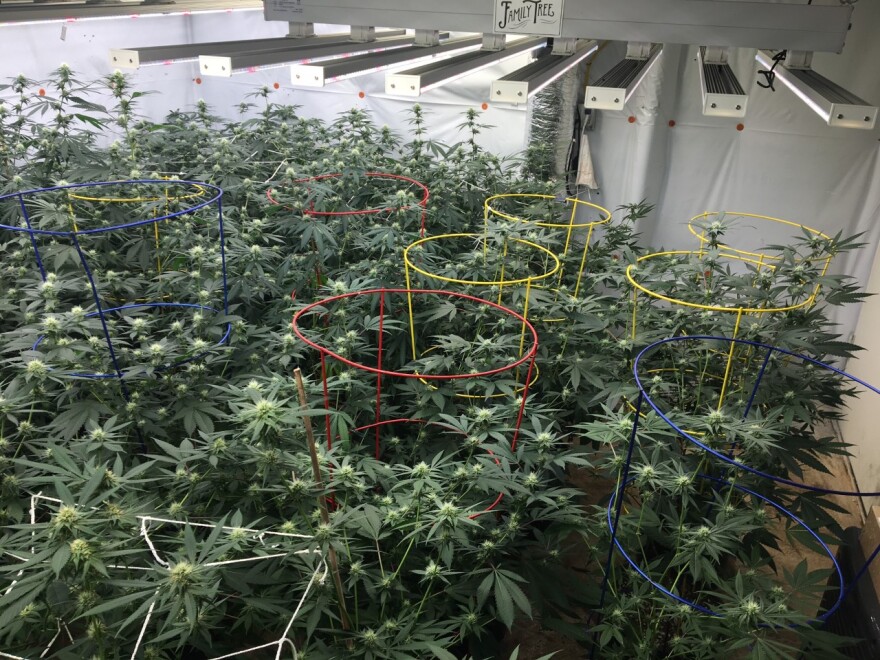
Jane Lanza: This is a nursery. So, these plants are all in their vegetative state. And this tent I'm going to open is a flowering tent.
Bob: Then they take me outside and show me where they're “hardening” plants off. And, while we're there, a big wind comes up and blows about a dozen plants off the table.
Ben: Yeah, they've been beaten up by this last wind. This storm and wind over the last X amount of time, certainly that's part of it — that's the hardening off.
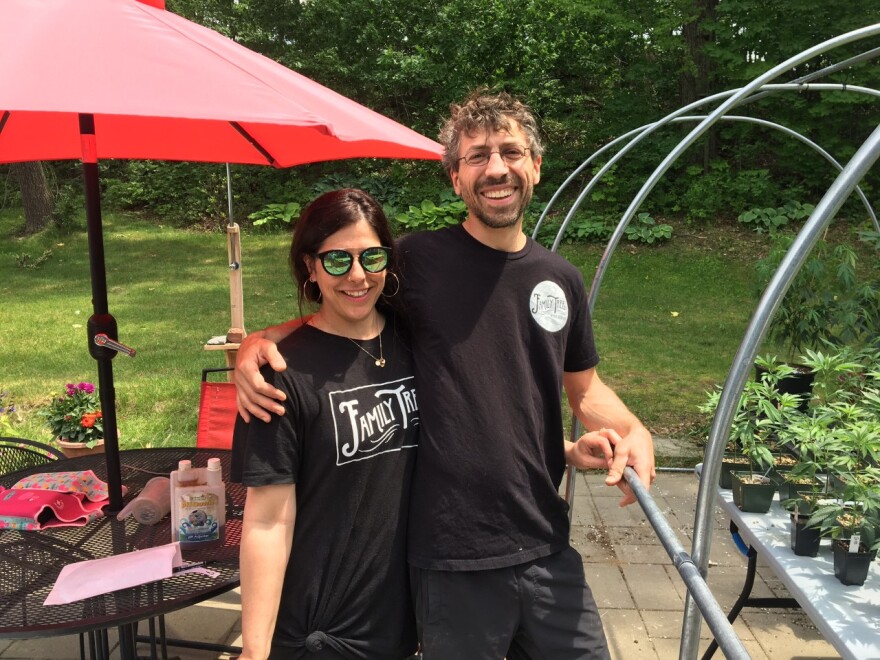
Bob: I should mention that another element of the Vermont law is the Social Equity Provision. The reason it's important is that it has a financial benefit to it in that most of the fees are waived for licensing. And it makes you eligible for a loan and grant fund of up to $50,000 to get your business off the ground. So, it's really encouraging folks who have been disadvantaged by cannabis laws in the past to give them a leg up and maybe provide them with some capital that they might find difficult to get otherwise. What this says is that Vermont is going to encourage people to qualify as "social equity applicants,” and to do that you have to meet one of three criteria:
- One is that you're a person of color.
- Two is that you belong to a community of people who have been disadvantaged by previous arcane, discriminatory cannabis laws.
- Three is you have either spent time in jail because of those cannabis laws or you have a family member who has spent time in jail inside.
Jane and Ben Lanza’s father, Frank, spent 18 months in federal prison in the early 1990s for possessing and distributing a large amount of cannabis. It was described to me as “a truckload.”
Frank Lanza: Yeah, these were some fairly bad people that I was in with, fairly bad.
Bob: You know, 30 years ago he spent 18 months in a federal prison that he describes as a very harsh place ...
Frank: What did I do there? I took this half-acre of ground and I planted a garden. I saved seeds from the mess hall, and when they saw I was serious, and things could happen, they started buying me seeds. And so I raised a bunch of vegetables. You know, peppers and tomatoes to give to the mess hall. So, that worked out. They left me alone for that reason. I was the gardener and they just didn't have to get involved.
Bob: ... And now, 30 years later, he’s got marijuana plants everywhere.
Frank: I'm just stunned by it. I really am. But it's great though. It's about time. I'm amazed. Amazed to pull up my driveway and see marijuana plants growing. Yeah.
Myra: I’m kind of emotional hearing that Frank is so optimistic and then I can’t help but wonder, for folks of color, if there’s any guilt associated with participating in an industry that has incarcerated maybe family members for decades now, and it wasn’t for a truckload, Bob, right? It was just for like … maybe a joint or something like that.
Bob: I think that’s a really important point, Myra. That people of color got sentenced to long times in jail for relatively small amounts of what we refer to as marijuana. And here’s a person who got 18 months for a truckload. I think what it shows is the incredibly disparities in sentencing based on a person’s color.
Ivan and Cindy Pudan, Snowbird Botanicals
Bob: I had the opportunity to go to Barnet and meet with Ivan and Cindy Pudan. And they have a place called Snowbird Botanicals. And they call it Snowbird because they also lived in Florida for a while and they would come back to Vermont for the growing season. And so they saw themselves as snowbirds, but now they’re here permanently. Ivan is originally from Trinidad, and Cindy is from Peru. And they had all their licensing fees waived through the Social Equity Provision. Their farm in Barnet is absolutely gorgeous.
Bob: You must love living here.
Ivan Pudan: We do. That is part of the reason why we chose to live here. We love that there are no signs on the streets. You know, driving here is actually enjoyable versus being in any traffic anywhere else.
Cindy Pudan: And the small businesses.
Ivan: Small business everywhere, the support for folks like us. There’s just no comparison.
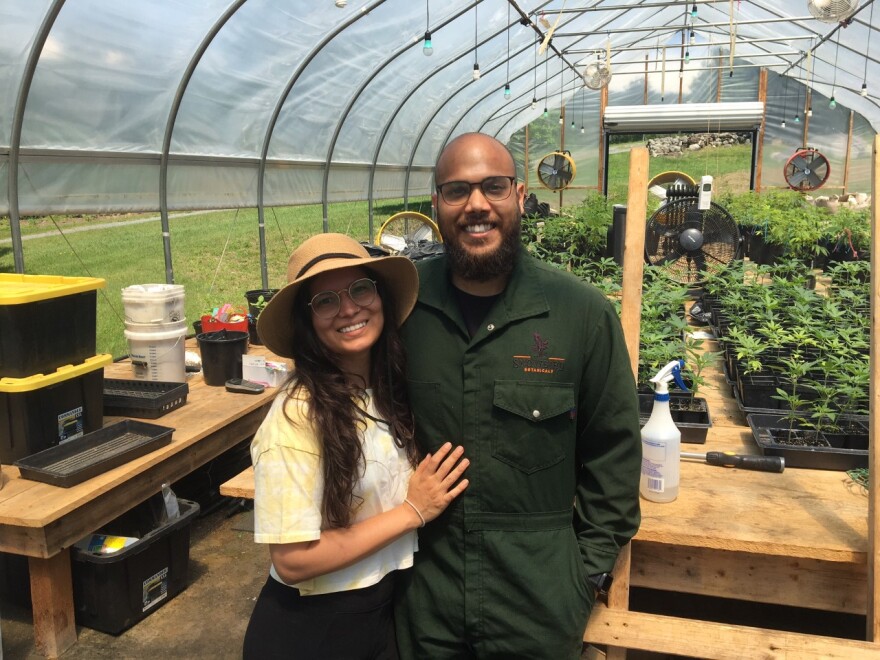
Bob: They have several hemp fields down below their house. They have a greenhouse for the new hemp plants and the new cannabis plants. And then they had this little barn where they process all of their products and separate them out. So, they're only dealing with the very highest quality products for their tinctures and for their balms.
Bob: So, you’re growing hemp, or have been for a number of years.
Ivan: Correct.
Bob: And you’re gonna make the transition to expand?
Ivan: Yes. We will also be incorporating cannabis this year. We came up here a few years ago to learn how to grow hemp. You know, essentially, they’re the same plants with the exception of the content of the final product. So, we learned how to grow hemp to get into the industry and we just fell in love. We fell in love with Vermont. We fell in love with the plants.
Bob: He says, you know, with everything that's going on in the world Vermont is a special place to be.
Ivan: Vermont has been very inviting. At the moment, you know, what’s going on in the world and the United States with minorities and everything, we really didn’t know how we were going to be perceived and how we were going to be accepted and such here because we didn’t know about Vermont before. But we have to say it’s been extremely positive.
Bob: Then I asked him how important having the social equity designation was to him to have all these fees waived. Did it open a few doors?
Ivan: Oh, it literally is the door. We would not have been able to turn the knob if that wasn't the case.
Bob: And then I asked him the question that Myra was referring to, I said, you know, I mean, how does it make you feel that you got this social equity designation because so many people of color were penalized and punished in the past and you're benefiting from it? So how does that work? I mean, how do you feel about that?
Ivan: So it actually is quite easy. Because we have gone through it ourselves. You know, I've, I've personally gone through quite a bit of — I hate using a term, you know, like racism and such, like, it's really silly in my opinion, but I have experienced it my whole life. We say it's easy, but it is hard to hear and see folks that are suffering because of it and there are so many people that their lives have been changed and turned so negative because of that one time they had a negative experience because of cannabis. And yeah, it's irreparable. But, hopefully, for lack of a better term, again, change, you know, we're hoping that change will eventually come in. And we really do feel like Vermont is a great place to, I mean, start. It's not even in the middle at all. We're at the beginning stages of all this.
Ashley Reynolds, Elmore Mountain Therapeutics
Bob: The third CBD manufacturer I met with was Elmore Mountain Therapeutics up in Morrisville. They have a booming CBD business and have decided that the federal obstacles are just too great. They've got a good CBD business going now. They think it'd be a distraction for them to go into THC cannabis. And so they are not going down that road. Ashley Reynolds is a co-owner. She's actually a member of the advisory board of the Cannabis Control Board.
Ashley Reynolds: We'd really like to see EMT CBD be a strong brand in these new dispensaries. But there's so much that goes in. It's not just that we don't have the wherewithal, like we've been operating a cannabis business for five years. But what we certainly have become really aware of are all the challenges.
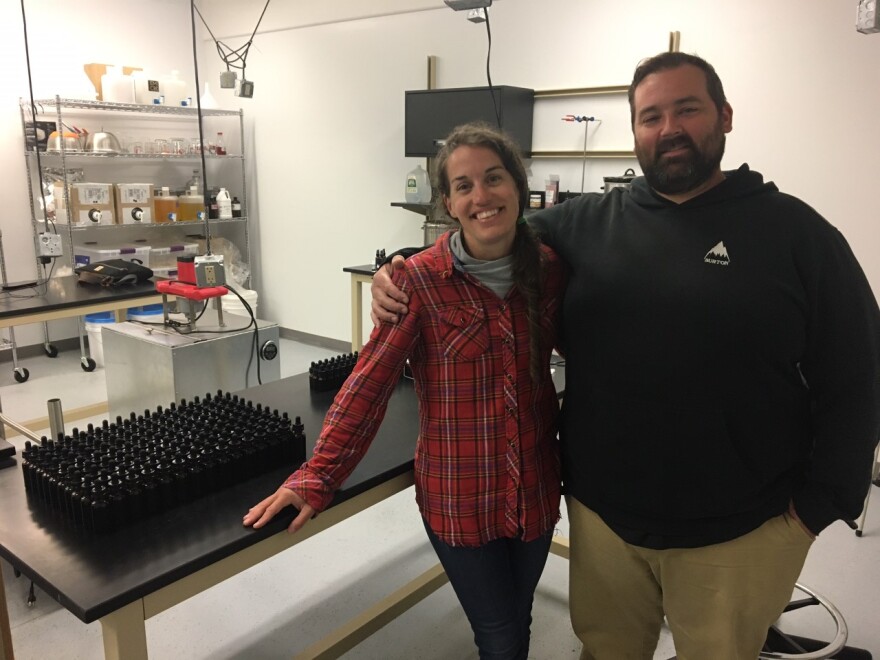
Myra: You know, I actually know Ashely Reynolds. We went to high school with her and she’s been on BLS before, I think in 2018 she was on our episode about what it takes to run a small business in Vermont. But now I know Ashley later in life, like as an adult, by her products.
Bob: And she also serves on the Women's Equity Committee of the Cannabis Control Board because she feels very strongly that women have a place in the cannabis industry and she wants to promote that as much as possible.
Ashley: So, I was appointed to the Social Equity and Compliance and Enforcement and I think my commitment to social equity to women, our brand, it's every fiber of what we do. I think what really fueled my desire to get into the industry is seeing all the injustices, the unfair things that continue to happen. I mean, we went from 37% female owned and operated stake in the cannabis industry to close to 25%. So, it's really hard and I think having examples of what could be is important for new entrepreneurs getting into the industry.
Bob: I have really been touched by these three growers, these three young couples who are venturing off into a new land. And their optimism, their can-do spirit. It would have been so easy to say, “Oh this rain is causing this problem and there’s a hole in the fence!” I’ve been around farmers before but these three couples, all young, just had this remarkable spirit to them. When I left them I thought, we are in good hands! It was reassuring to me. It was very hopeful. So I just felt that. I just wanted you to know that.
Loading...
Credits:
Bob Kinzel reported this episode. Myra Flynn produced it, and she also did the mix and sound design. Editing and additional production from Josh Crane and Angela Evancie. Ty Gibbons composed our theme music; other music by Blue Dot Sessions.
Special thanks to Geoffry Pitzzutillo.
As always, our journalism is better when you’re a part of it:
- Ask a question about Vermont
- Sign up for the BLS newsletter
- Say hi on Twitter,Instagram and Reddit @bravestatevt
- Drop us an email: hello@bravelittlestate.org
- Make a gift to support people-powered journalism
- Tell your friends about the show!
Brave Little State is a production of Vermont Public.





